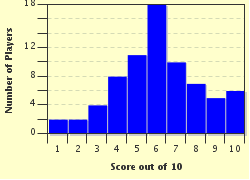Quiz Answer Key and Fun Facts
1. A bit of mental arithmetic to get us started: Pick any number, add two and then multiply the sum with two. Deduct the number you picked and add three. What do you have left?
2. Most months in the Western calendar have 31 days. But how many do?
3. An Italian named Fibonacci saw that many things in nature follow a sequence that starts as follows: 1, 1, 2, 3, 5, 8, 13, 21. What is the next number?
4. Some numbers you don't want to pick! For instance, the number thirteen is often skipped in airplane seat rows, hotel room numbers or even floors of highrise buildings. In China, Japan, and other countries in East Asia, another number is considered seriously unlucky. Which?
5. Numerical order is different from alphabetical order. Which of the following numbers have all its letters, when written in English, in alphabetical order.
6. If a number of random people meet in a group, how many do they need to be for the odds of at least two of them sharing a birthday (not year!) is better than 50-50? Disregard the exotic case of 29 February.
7. Remember our friend Fibonacci from earlier in this quiz? When traveling in North Africa, he picked up something that he started to popularize in Europe in his book "Liber abaci". What was that?
8. Some numbers are referred to as "prime numbers". Which is the only even prime number?
9. If you ask someone to pick a favorite number, chances are that they would pick seven: a number considered both lucky and magical by many. There are lots of references to the number seven in not only Western culture. Which of the following is *NOT* seven?
10. We have dealt with integers only in this quiz so far. There are an infinite number of integers, but there are actually different types of infinities. Which type of numbers are there most of?
Source: Author
akg1486
This quiz was reviewed by FunTrivia editor
trident before going online.
Any errors found in FunTrivia content are routinely corrected through our feedback system.

